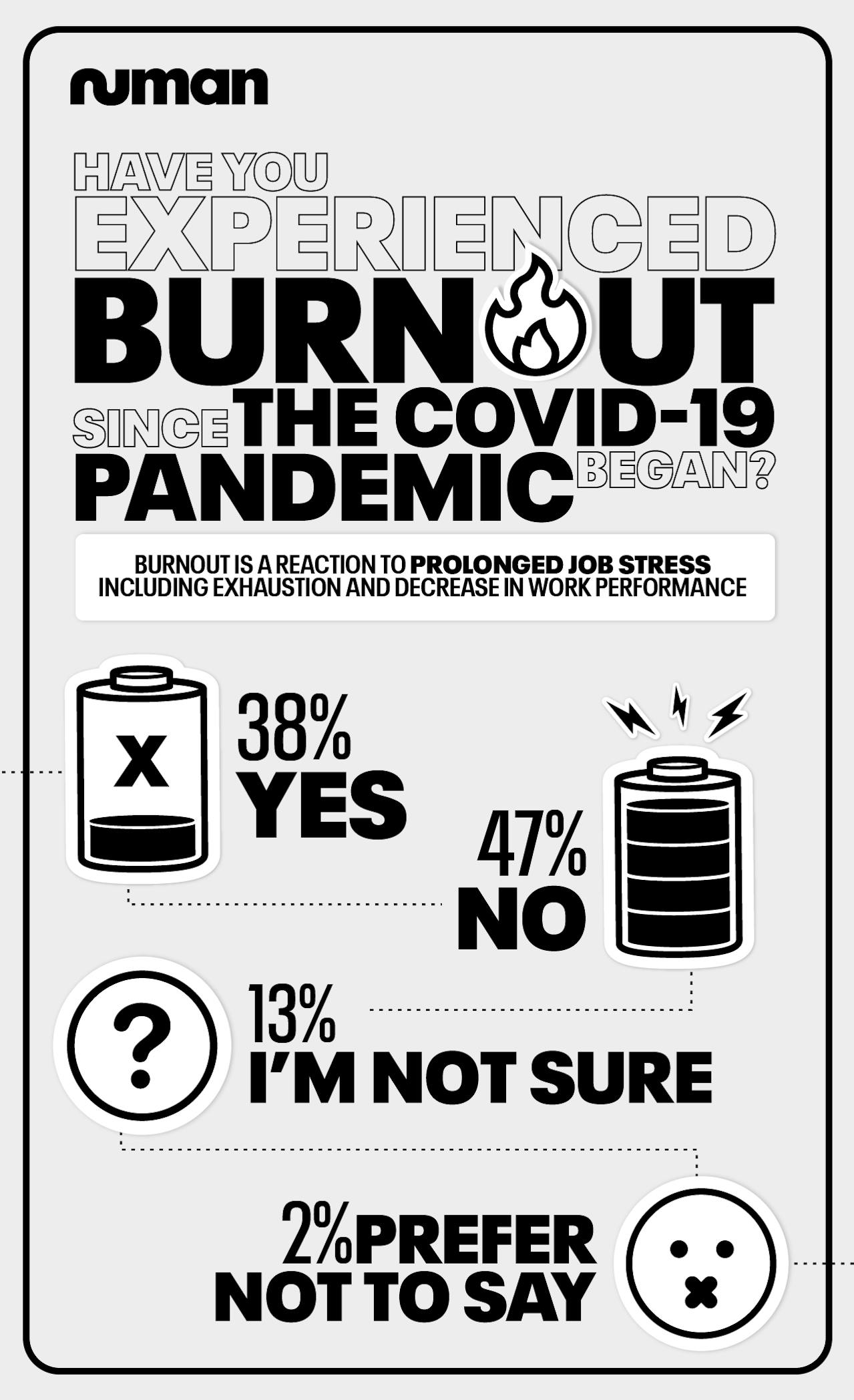Signs, symptoms and treatments: Dr Luke Pratsides answers all your questions on burnout.
Everyone feels stressed from time to time but a prolonged episode of stress may lead to what’s known as ‘burnout syndrome’. It’s specifically associated with workplace stress and has been on the rise since the pandemic hit.
Our survey revealed that over a third of men have experienced burnout since the start of the pandemic.
But what is it? And how do we prevent it? We asked our lead GP, Dr Luke Pratsides, about the causes, symptoms and treatments of this growing phenomenon.
What is burnout?
Burnout is characterised by constant feelings of physical and emotional exhaustion and an inability to motivate oneself, as a result of prolonged workplace stress. This workplace fatigue can spill over into other areas of a person’s life causing them to lack the motivation to get on with everyday tasks.
“In medical terms, the symptoms of burnout are similar to depression, however, burnout is specific to workplace stress. It’s been a growing concern since the pandemic left people with less than suitable working conditions and restrictions on leaving the house,” says Dr Pratsides.
This year has transformed our style of working and blurred the line between work life and home life. This has taken its toll on people’s mental health and our survey revealed just how worrying the rise in burnout syndrome is.
What are the symptoms of burnout?
Dr Pratsides explains, “Burnout is multifaceted with both physical and psychological symptoms.
When a person experiences burnout, they feel:
- Emotionally exhausted
- Emotionally drained
- Unable to cope
- Unenthusiastic
- Demotivated
- Negative
- Uninterested
- Hopeless
Chronic stress can also manifest itself in physical ways, such as:
- Chronic pain
- Intestinal issues
- Headaches
- Migraines
- Diarrhoea
- Vomiting
- Psoriasis
- Eczema
- Gum disease
If you’re experiencing burnout, you’re at greater risk of developing depression, so it’s important you follow expert advice on how to prevent burnout as soon as you spot the warning signs.”
What causes burnout?
Burnout was originally used to describe workers in ‘helping’ professions (clinic assistants, doctors, or nurses) but it’s now thought that anyone can experience burnout, regardless of their profession or job level.
A report by GALLUP found the following working conditions put an employee at greater risk of burnout:
- Unfair treatment at work
- Unmanageable workload
- Unclear communication from managers
- Lack of support from managers
- Unreasonable time pressure
The pandemic has also brought about new obstacles when it comes to job satisfaction with unsuitable working conditions and companies struggling to adapt to new ways of working. This has caused the breakdown of the usual working structure. On top of this, having staff furloughed and made redundant means that many employees are left with far less direction and support.
Certain personality traits can also put a person at greater risk of burnout, such as being a perfectionist or having a pessimistic outlook on life.
How to recover from burnout
There are steps you can take to recover from burnout or prevent it from occurring.
Dr Pratsides gives the following advice to overcome burnout:
- Speak to your manager: Describe how you’re feeling to your manager - you won’t be the first or the last employee to face mental struggles. Ask for specific goals so that your day can be more structured and explain the difficulties that you’re facing with your current workload. If you feel unable to speak to your line manager, talk to someone in the HR department.
- Make changes to your work environment: This is of particular importance since the pandemic changed the way we work with a vast number of employees now working remotely. Many people have chosen to work from their bed which has disastrous effects not just physically, but mentally as well. It’s important to change your posture, stand up, and move about regularly. This lowers your risk of obesity, type 2 diabetes, heart disease and cancer. Working from your bed also has a mental strain, wreaking havoc on your sleeping habits and making it difficult to dissociate work life from home life. If you don’t have a suitable alternative, such as a dining table, you should speak to your employer about a budget for a desk and chair.
- Take some time out: Everyone needs a break sometimes. It’s important to take some time out to re-energise and focus on yourself. If work is making you feel overwhelmed, it might be a good time to take a few days off. The pandemic restrictions on travel abroad mean many people are saving up their annual leave, in the hope they might be able to holiday abroad soon. This can lead to prolonged periods of work with no respite. Don’t save up all your leave and take some time off, you might be surprised what fun you can have locally or on a staycation.
- Spend time outside: It’s important to get outside regularly as being outdoors has incredible health benefits such as vitamin D from the sun.
- Exercise: If you exercise regularly you’ll gain physical strength, muscle and tone but mentally, you’ll reap the benefits too. Exercise triggers the release of endorphins - it’s a huge mood booster. Exercising outdoors is particularly beneficial.
- Make time to relax: Always set aside time for yourself to relax and unwind. You might enjoy yoga, reading, or sitting in the park. Find what works best for you and make sure you have time away from work every day.
- Practice good sleeping habits: Getting into a routine at night will remind your body that it’s time to go to sleep. You might also benefit from a sleep supplement before bed, or spending less time in your bedroom throughout the day. You shouldn’t look at a screen for at least an hour before bed because the light from the screen can confuse the body’s natural sleep cycle into thinking it is daytime.
- Talk to your family and friends: Speak to your loved ones about how you’re feeling. You’re not alone and it’s crucial that you don’t suffer in silence.
- Speak to your GP: If you’ve been suffering from a lack of energy, motivation and any other symptoms of burnout then you should visit your local GP. You can discuss the best course of action to treat your symptoms and improve your health and wellbeing.
Burnout is rife among the population so remember that you aren’t suffering alone. It’s crucial that you look out for the warning signs and take the necessary steps to prevent it.









